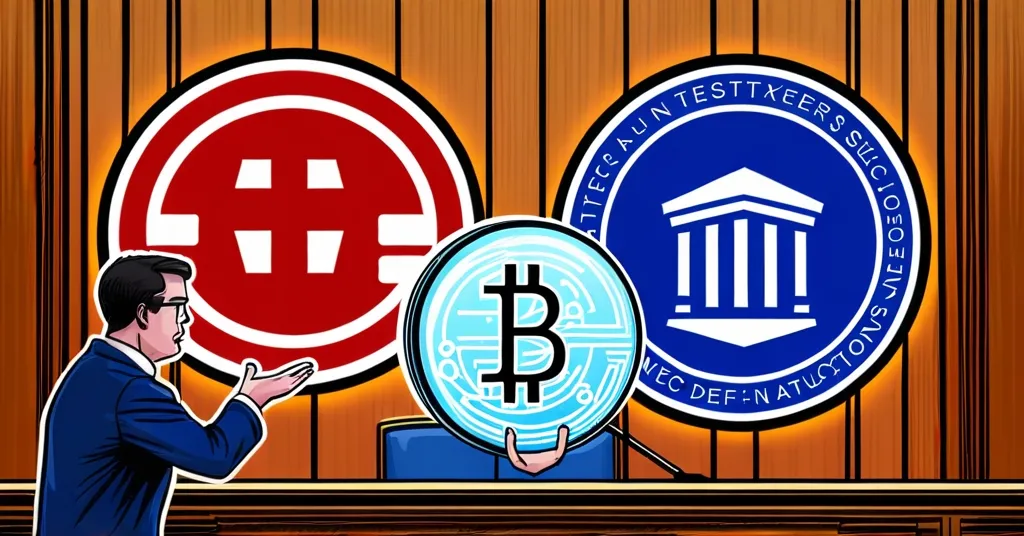Consensys Challenges SEC’s DeFi Rule: A Battle for Blockchain Innovation

Consensys Urges SEC to Rethink DeFi Exchange Rule: A Clash Over Regulation and Innovation
Consensys, a leading blockchain software developer, has formally challenged the U.S. Securities and Exchange Commission’s (SEC) proposed amendment that aims to redefine “exchange” to encompass decentralized finance (DeFi) protocols. This move, if implemented, could reshape the regulatory landscape for the crypto industry.
- Consensys opposes SEC’s amendment to include DeFi under “exchange.”
- Argues rule exceeds Congress’s intent and violates legal and constitutional rights.
- Potential impact on hundreds to thousands of blockchain projects.
Background
The SEC’s proposal to amend Exchange Act Rule 3b-16, initially floated in January 2022, seeks to broaden the definition of an “exchange” to include DeFi systems. After receiving feedback from around 250 comments, the SEC reopened the comment period in April 2023, highlighting the ongoing regulatory tug-of-war over how to classify and regulate decentralized platforms. Decentralized Finance (DeFi), which operates on public blockchains without traditional intermediaries like banks, has been at the center of this debate. The SEC views DeFi systems as trading in securities, a perspective that has stirred controversy and concern within the crypto community.
Consensys’s Argument
Consensys’s opposition to the proposed rule change is multifaceted. In a letter submitted to the SEC, the company argues that the amendment exceeds Congress’s original intent for defining an “exchange.” They claim it violates the Administrative Procedure Act (APA), a law that governs how federal agencies make and enforce rules, by not considering public comments from 2022. Moreover, Consensys asserts that the rule offers no tangible benefits and seems designed to extend the SEC’s regulatory reach without proper cost-benefit analysis.
The company also raises constitutional concerns, stating that the amendments infringe on First and Fifth Amendment rights. The First Amendment violation stems from the broad coverage of all communication protocols, defined as the rules and standards that allow different systems to communicate, without requiring affirmative action. The Fifth Amendment issue arises from the lack of clarity on key terms, which Consensys argues violates due process.
“As an initial matter, the number of entities that would be affected by the amendments is substantially undercounted: we are told that there would be only 35 to 46 New Rule 3b-16(a) Systems, between 15 and 20 of which trade digital assets. That number is far too low when, especially given the amendments’ expansive but amorphous scope, when we are dealing with an ecosystem with hundreds if not thousands of projects and protocols.” – William C. Hughes, Senior Counsel at Consensys
Potential Impact
The proposed rule change could have significant ramifications for the blockchain ecosystem. Consensys estimates that the SEC’s underestimation of affected entities is vastly off the mark, potentially impacting hundreds to thousands of blockchain projects and protocols. This could stifle innovation and drive DeFi platforms out of the U.S. market, a concern echoed by SEC Commissioner Hester Peirce, who warned of potential “regulatory expatriation.”
The complexity of compliance for DeFi systems adds another layer of difficulty. Service providers such as digital wallet providers, blockchain miners, and validators would face a steep challenge in meeting the governance obligations typically required of exchanges. The SEC’s own economic analysis acknowledges higher costs and uncertainty in applying these rules to DeFi, reinforcing Consensys’s argument about the lack of a proper cost-benefit analysis.
SEC’s Perspective
From the SEC’s standpoint, the amendment aims to protect investors from potential fraud in the largely unregulated DeFi space. SEC Chair Gary Gensler has supported the proposal, arguing that most crypto tokens are securities and that the rule would promote resiliency, access, and fairness in the market. However, the SEC’s approach has been met with resistance not only from Consensys but also from within its ranks, as Commissioner Peirce dissented against the reopening of the comment period, highlighting the potential stifling effect on innovation.
Next Steps
Consensys is calling on the SEC’s crypto task force, led by Commissioner Peirce, to reconsider and withdraw the proposed definition change from the regulatory agenda immediately. The outcome of this regulatory battle could have far-reaching implications for the future of DeFi and blockchain innovation in the U.S.
Bitcoin and e/acc
While the proposed rule primarily targets DeFi, it could indirectly affect Bitcoin, the flagship cryptocurrency that many see as the foundation of the decentralized movement. Bitcoin maximalists argue that any regulatory action that stifles innovation in the broader crypto space could ultimately impact Bitcoin’s ecosystem. Furthermore, this regulatory battle aligns with the principles of effective accelerationism (e/acc), which emphasizes the need for rapid technological advancement without stifling innovation. The fight for clarity and fairness in DeFi regulation is a testament to the broader push for decentralized technologies to disrupt the status quo.
Key Takeaways and Questions:
- What is the main contention of Consensys regarding the SEC’s proposed rule change?
Consensys argues that the amendment exceeds Congress’s original intent, violates legal and constitutional rights, and offers no real-world benefits.
- How does the proposed rule change potentially affect the blockchain ecosystem?
It could impact hundreds to thousands of projects, potentially stifling innovation and driving DeFi platforms out of the U.S.
- What constitutional amendments does Consensys claim are violated by the SEC’s amendments?
Consensys claims violations of the First Amendment by overreaching on communication protocols and the Fifth Amendment due to lack of clarity on key terms.
- Why does Consensys argue that the SEC’s amendments lack a proper cost-benefit analysis?
Consensys believes the SEC did not sufficiently analyze the wide-ranging impact on blockchain projects.
- What action does Consensys request from the SEC’s crypto task force?
They demand the immediate withdrawal of the proposed definition change from the regulatory agenda.
As the crypto market, valued at $3.11 trillion and nursing a 1.70% loss in the past day, continues to evolve, the battle over DeFi regulation remains a critical issue. Consensys’s challenge to the SEC’s proposed rule change underscores the ongoing tension between fostering innovation and ensuring investor protection in the dynamic world of blockchain and cryptocurrency. The outcome of this regulatory skirmish will be closely watched by industry players and enthusiasts alike, as it could set a precedent for how decentralized technologies are governed in the future.



